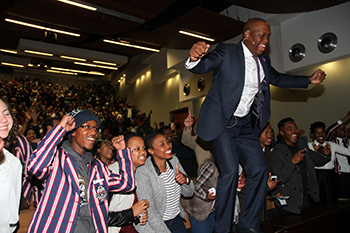Latest News Archive
Please select Category, Year, and then Month to display items
12 January 2024
|
Story Nonsindiswe Qwabe
|
Photo Sonia Small
 Since joining the UFS in 2008, Dr Grey Magaiza has worked extensively on approaches that can foster the socio-economic transformation of societies.
Since joining the UFS in 2008, Dr Grey Magaiza has worked extensively on approaches that can foster the socio-economic transformation of societies.
“The future should be one where communities can decide on their development agenda and futures. That’s the most important for me.” Dr Grey Magaiza, Deputy Director of the Centre for Gender and Africa Studies (CGAS) and Head of the Community Development programme on the Qwaqwa Campus, is passionate about capacitating communities to be agents of change and advancement. His vision for the future emphasises the empowerment of communities to take charge of their development by actively participating in decision making and the implementation of development projects that can improve their lives.
Since joining the UFS in 2008, Dr Magaiza has worked extensively on approaches that can foster the socio-economic transformation of societies. Over the years, he has crafted his research speciality into one that he is most proud of – being an interdisciplinary scientist immersed in the development of communities.
“I’m in a fortunate position of researching what I like. I say ‘fortunate’, because I’ve taken the time to understand what I’m passionate about, which is the overall field of rural livelihoods and livelihood futures – in short, community development. My research starts from an engaged university, understanding the elements that a university must use to enhance transformation and relevance to its immediate community in terms of development.”
One of the ways he has done this is by looking at social entrepreneurship as a development approach for young people in a rural setting. Through workshops with non-profit and civic organisations in Qwaqwa, Dr Magaiza has been helping these organisations to map out their needs and actively meet them through the involvement and support of external role players.
“We understand that communities are part of the national development agenda, but even that national agenda respects community knowledge and intentions and allows communities to shape their identity. A critical enabler of this is community organising. You bring back the capacity in communities to have dialogues on issues affecting them as spaces for engagement, knowledge exchange, and for people to just talk about their way forward.”
By enabling communities to define their development agenda, they can address their specific needs, challenges, and aspirations, he said. “When I look at livelihood futures, it’s quite an exciting aspect of my work – it’s like looking into a fortune tellers’ globe, because you’re not deciding for communities what they should do, but the communities themselves take those decisions.”
Vusi Thembekwayo enthrals Kovsies
2016-08-18

Vusi Thembekwayo delivered an impressive
lecture at UFS
Kovsies students and aspiring entrepreneurs who attended Vusi Thembekwayo’s Like a Boss: Show me the Money lecture will certainly agree that he is indeed the “Rockstar of public speaking”.
Through his sublime oratory skills, blended with flagrant humour, the seasoned serial entrepreneur captivated the capacity audience at the University of the Free State’s EBW Auditorium.
The lecture’s main purpose was for the 31-year-old - who has already achieved immense success in business - to offer valuable business advice and financial literacy. And he did just that.
Thembekwayo explained how innovation has always been driven by necessity. He also mentioned why he believes black people were struggling to build or grow sustainable businesses in the country.
“There is no black capital in SA. There are no schools to teach black people how to start businesses,” Thembekwayo said.
He said black people often opted out of their societal problems in spite of being conscious of them. This was a reference to the visible trend of black people who pursue success for their own personal enrichment.
For the country to solve these problems, amongst many others, Thembekwayo stressed that a labour absorptive economy, which also creates entrepreneurial opportunities, is essential.
Mechanical engineer and World Economic Forum (WEF) Innovator of the Year Award recipient, Nneile Nkholise and Dr Johan van Zyl, from the UFS Centre for Development Support were guest speakers at the event.